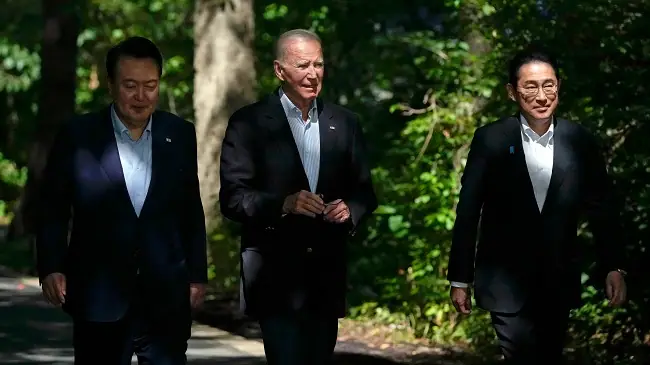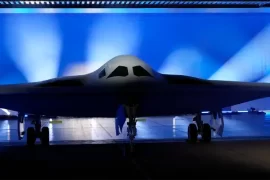The Camp David Trilateral Summit of 2023, which brought together leaders from the United States, Japan, and the Republic of Korea (ROK), marks a historic moment in international diplomacy with significant implications for the Indo-Pacific region. This article analyzes the key aspects of the summit and its potential to reshape the Indo-Pacific.
Historical context
The summit takes place at a time when U.S.-China relations have grown increasingly contentious, and North Korea’s nuclear capabilities continue to pose a regional threat. In response, the United States, Japan, and the ROK have sought to strengthen their trilateral security cooperation, a development with historical roots.
During the Cold War, the United States recognized the strategic value of trilateral cooperation among Japan, South Korea, and itself in defense and deterrence. In the post-Cold War era, this alliance also became essential for supporting the U.S.-led liberal international order.
Two significant historical moments in this trilateral relationship are worth noting. The first, in 1965, saw the United States broker the normalization of diplomatic relations between Japan and South Korea. It led to economic assistance and technological cooperation that played a pivotal role in South Korea’s economic development. The second, less positive, moment occurred in 2022 when Japan-South Korea relations hit a low point, marked by asset disputes and strained diplomatic ties.

The Camp David Summit in 2023 represents a third historic moment in this relationship, signaling a renewed commitment to cooperation. The summit’s outcomes are notable, particularly the institutionalization of high-level meetings, the establishment of trilateral military exercises, and agreements on supply chains, combatting disinformation, and development assistance.
The Significance of the Camp David Summit for the Indo-Pacific
The summit firmly aligns with the concept of a “Free and Open Indo-Pacific,” and underscores the principle that a challenge to the security of one of three countries affects the security of all. This recognition is a foundational understanding highlighted in the summit’s statements. This is a significant step in shaping the future of the Indo-Pacific in several key ways:
Expanding the scope of the U.S.-ROK alliance
Historically the U.S.-ROK alliance has predominantly focused on addressing North Korean threats. With the trilateral framework expanding its scope to encompass the Indo-Pacific, the alliance is evolving to tackle broader regional challenges, including those related to security, economics, and diplomacy. This expansion enhances the U.S.-ROK partnership’s significance in the region beyond the Korean Peninsula.
Elevated Security Cooperation
While there are mutual defense treaties between the United States and Seoul and between the United States and Tokyo, no such legal arrangement exists between Tokyo and Seoul. The trilateral commitment to consult on security matters elevates cooperation to a higher level. It creates a platform for strengthening bilateral relations between Japan and South Korea.
The trilateral security cooperation will also include enhancing defense exercises, sharing real-time missile warning data, and coordinating responses to regional challenges and provocations. These measures will contribute to a more robust and coordinated security posture in the Indo-Pacific, dissuading potential aggressors.
Countering China’s Economic Influence
The summit’s acknowledgment of China’s increasing influence in the military and economic domains emphasizes the determination of the three countries to counter it.
The summit’s mention of peace and stability across the Taiwan Strait, for example, signals a united stance on this sensitive issue. The tone is measured. But, the reaffirmation of their commitment to the peaceful resolution of disputes and avoidance of unilateral actions is a significant message to Beijing.
They are also actively working to offer alternatives to China’s economic influence and safeguard the economic interests of regional nations.
For example, the MoU among the development finance institutions of the United States, Japan, and the ROK signifies their intent to mobilize financing for quality infrastructure in the Indo-Pacific. This can be a counterweight to China’s BRI at land and sea. This initiative aligns with broader efforts to improve infrastructure, including information and communications technology (ICT), promote carbon neutrality, and strengthen resilient supply chains.
Bolstering Existing Regional Architectures:
The summit’s focus on strengthening established regional structures, such as ASEAN (Association of Southeast Asian Nations) and the Pacific Islands Forum, demonstrates a renewed commitment to multilateralism, which waned during the Trump era. The Summit has also established a trilateral maritime mechanism focused on capacity building in Southeast Asia and Pacific Island countries. It underscores the importance of enhancing maritime law enforcement and domain awareness, which are crucial elements for maintaining maritime security in the Indo-Pacific.
Challenges and Future Prospects
While the Camp David Summit holds great potential for rapprochement between South Korea and Japan, historical and nationalistic disputes between them remain unresolved, posing challenges to the durability of their relations.
Furthermore, concerns about potential changes in U.S. foreign policy in the future could impact the trilateral partnership. It was seen in the shift during the Trump era.
Additionally, China and North Korea have criticized the trilateral alliance’s emergence, potentially leading to regional power shifts and challenges to the resolve of the three countries.
As the trilateral framework interacts with other regional minilaterals, such as the Quad, ensuring synergy among these cooperative agendas will be critical to advancing their shared goals in the Free and Open Indo-Pacific.
Summary
In summary, the implications of the Camp David Trilateral Summit for the Indo-Pacific are significant and multifaceted. They encompass not only security concerns but also economic, diplomatic, and regional cooperation aspects. The commitment to a Free and Open Indo-Pacific, coupled with coordinated efforts to address regional challenges, positions the United States, Japan, and the ROK as key players in shaping the future of this vital and dynamic region. Their actions will undoubtedly influence the course of events in the Indo-Pacific for years to come.







